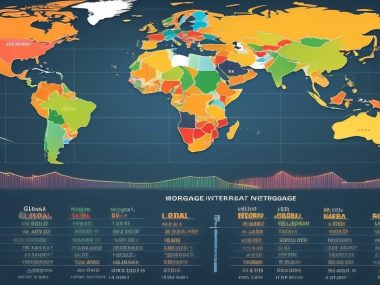Discover a surprising fact: Canada’s real estate market is open to foreign buyers, including mortgages for non-residents and new immigrants. As an international investor, navigating the Canadian mortgage landscape may seem daunting, but with the right information and guidance, it can be a smooth process. By the end, you’ll have a clearer understanding of how to make your dream of owning property in Canada a reality.
Key Takeaways
- Understand the eligibility criteria for foreigners seeking a mortgage in Canada.
- Explore the various mortgage options available for non-residents to purchase property in Canada.
- Familiarize yourself with the application process for obtaining a mortgage as a foreigner.
- Stay informed about the current real estate market trends and conditions in Canada.
- Be prepared for the challenges that non-residents might face when applying for a mortgage in Canada.
- Consider alternative solutions or financial planning strategies to overcome obstacles in securing a mortgage.
Mortgage Eligibility
Non-resident Criteria
To be considered a non-resident in BC, Canada, specific qualifications must be met. Understanding these criteria is crucial for foreigners seeking a mortgage. The 15% non-resident speculation tax applies to citizens who haven’t resided in Canada for over six months, impacting their property purchase decisions. Foreign buyers, when purchasing property with Canadian permanent residents, are classified as non-residents by banks due to their residency status and credit history.
Required Documentation
When applying for a mortgage as a non-resident in BC, Canada, certain essential documents including credit history, CMHC insurance, and payment are needed. These include a reference letter, Foreign Income Verification Statement, employment letter, and Canadian credit check. Providing detailed documentation is vital to increase the chances of mortgage approval. Personally, I found that preparing these documents meticulously expedited my mortgage application process significantly.
Credit Score Importance
Having a good credit score is paramount when applying for a mortgage in BC, Canada. Your credit score, payment history, and rate directly influence your eligibility for home mortgage loans. Improving your credit score can enhance your chances of approval. I realized the importance of maintaining a healthy credit score early on and worked diligently to improve it before applying for a mortgage.
Down Payment Rules
Non-residents seeking mortgages in BC, Canada must adhere to specific down payment requirements. They are typically required to make a 35% down payment when purchasing property. Understanding how down payment rules differ for non-residents compared to Canadian citizens is crucial for successful mortgage applications.
Mortgage Options
Traditional Banks
Traditional banks in BC, Canada offer mortgage options for non-residents, subject to specific criteria. Non-residents typically need a larger down payment compared to residents. Eligibility requirements include proof of income and credit history.
Obtaining a mortgage from traditional banks as a non-resident provides security and reliability. However, the process may be more stringent due to residency status. Non-residents may face limitations in terms of loan amount, interest rates, and credit.
Private Lenders
Private lenders provide alternative mortgage options for non-residents in BC, Canada. They offer flexibility in terms of eligibility criteria, credit, and loan terms. Non-residents have the opportunity to secure financing without meeting traditional bank requirements.
Compared to traditional banks, private lenders may charge higher interest rates but offer quicker approval processes. Working with private lenders can be beneficial for non-residents seeking faster financing solutions.
Alternative Financing
Non-residents looking to purchase property in Canada can explore alternative financing solutions beyond traditional banks and private lenders. Creative financing options such as seller financing or joint ventures provide avenues for securing a mortgage.
Government regulations may pose challenges for non-residents seeking mortgage approval. Exploring alternative financing requires careful consideration of legal implications and financial risks associated with unconventional borrowing methods.
Application Process
Step-by-Step Guide
Navigating the mortgage application process as a non-resident in BC, Canada involves several key stages. Begin by researching different lenders and their offer for foreigners. Next, gather all necessary documents such as proof of income, identification, and credit history.
Understanding the requirements set by lenders is crucial to ensure a smooth application process. Periodically check for updates on mortgage rates and regulations to make informed decisions. Seek guidance from professionals if needed to clarify any doubts during the process.
Professional Assistance
Seeking professional assistance when applying for a mortgage as a non-resident in BC, Canada can be highly beneficial. Mortgage brokers and financial advisors have expertise in dealing with non-residents’ applications. They can provide valuable insights on the best mortgage options available.
Professionals can help streamline the application process and guide you through each step efficiently. Their knowledge of the local real estate market can assist in making informed decisions regarding property purchase. Consider consulting with experts to enhance your overall experience.
Application Submission
When submitting a mortgage application as a non-resident in BC, Canada, ensure all required documentation is complete and accurate. Double-check all forms and information before submission to avoid delays or rejections. Seek guidance from professionals if unsure about any aspect of the application process.
Understanding the steps involved in submitting an application is essential for a successful outcome. Move forward with confidence knowing that you have fulfilled all requirements accurately. Pay attention to details to increase your chances of approval.
Real Estate Market Overview
Post-Pandemic Trends
The mortgage market for non-residents in BC, Canada has witnessed significant changes post-pandemic. Mortgage rates have fluctuated due to economic uncertainties, impacting the affordability of properties. Regulations have also tightened to ensure financial stability in the real estate sector.
Understanding these shifts is crucial for non-residents looking to invest in Canadian properties. The pandemic has led to increased demand for certain types of properties, such as suburban homes with more space. This shift has influenced the types of mortgages available and their terms.
As a potential investor, researching current market dynamics is essential to make informed decisions. Keeping track of trends like changing regulations and property demands can help navigate the complexities of the mortgage landscape effectively.
Metro Vancouver Prices
Metro Vancouver remains a sought-after location for non-resident buyers, but property prices continue to fluctuate. Various factors, including supply and demand dynamics, government policies, and economic conditions, play a role in determining property prices.
Understanding these factors can provide valuable insights into when to enter the market and which type of property to invest in. Forecasting real estate trends in Metro Vancouver requires a deep understanding of both local and global economic influences.
Investing in real estate as a foreigner comes with its challenges but offers rewarding opportunities if approached strategically. Conducting thorough research and seeking guidance from local experts can help navigate the complexities of the Metro Vancouver real estate market successfully.
Non-resident Challenges
Tax Considerations
Understanding the tax implications is crucial for non-residents buying property in Canada. Land transfer taxes and property taxes are key considerations. These taxes directly impact the overall cost of property ownership for non-residents.
For non-residents applying for mortgages in BC, Canada, exploring the available interest rates is essential. The determination of interest rates for non-residents involves various factors. Strategies can be employed to secure competitive interest rates when applying for a mortgage.
- Pros:
- Understanding tax obligations helps in budgeting effectively.
- Competitive interest rates can lead to significant savings over time.
Interest Rates
Property purchases by non-residents in Canada are subject to specific restrictions and regulations. It’s vital to understand these limitations on foreign ownership of residential properties. Exceptions provided under the law offer some flexibility.
When investing in Canadian real estate, being aware of the property restrictions is crucial. These restrictions significantly influence the choices available to non-residents looking to invest. Understanding these regulations helps in making informed decisions.
Alternative Solutions
BC Specific Options
Non-residents seeking mortgages in British Columbia, Canada, have specific options tailored to their status. Unlike other provinces, BC offers unique regulations that cater to non-resident buyers. Understanding these regulations is crucial for foreigners looking to invest in BC’s real estate market. The province’s rules can significantly impact the process and requirements for obtaining a mortgage.
One advantage of purchasing property in BC as a non-resident is the variety of mortgage products available. From fixed-rate mortgages to variable rate options, non-residents have flexibility in choosing a loan that suits their financial needs. However, with this diversity comes the challenge of navigating through the different regulations and eligibility criteria set by lenders in BC.
Equity Assessments
Equity assessments play a vital role in determining the feasibility of obtaining a mortgage for non-residents in BC. Lenders use equity assessments to evaluate the risk associated with lending money to individuals who are not Canadian residents. By having a clear understanding of how equity assessments work, non-residents can strategically position themselves to increase their chances of securing a mortgage.
Improving your equity position involves building a strong financial profile and demonstrating stability through assets and income sources. Non-residents can enhance their chances of approval by showcasing a healthy financial history and providing substantial evidence of their ability to repay the loan. By focusing on maximizing equity, foreign buyers can overcome one of the primary challenges they face when applying for mortgages in BC.
Financial Planning
Budgeting for Purchase
Creating a budget when purchasing property in Canada as a foreigner is crucial. Understanding the costs involved helps in planning effectively. Calculate expenses like down payment, closing costs, legal fees, and property taxes. Consider additional costs such as maintenance, insurance, and utilities to avoid financial surprises.
To manage your finances efficiently during the purchase process, it’s essential to set a realistic budget. Seek advice from financial experts or real estate professionals for guidance. Prioritize essential expenses and allocate funds wisely to stay within your financial limits.
Managing Expenses
As a non-resident property owner in Canada, staying on top of expenses is key to financial stability. Explore strategies like setting up automatic payments for bills and creating an emergency fund for unexpected costs. Understand the ongoing responsibilities such as property taxes, mortgage payments, and potential repairs.
Effective expense management techniques include tracking your spending, negotiating service contracts for better rates, and exploring cost-saving measures like energy-efficient upgrades. By maintaining a detailed record of expenses and income, you can make informed decisions to safeguard your financial well-being.
Legal Considerations
Ownership Laws
Property ownership for non-residents in Canada is governed by specific laws and regulations. Understanding these terms is crucial for foreigners looking to invest in Canadian real estate. Non-resident citizens need to be aware of their rights, restrictions, and obligations when owning property in Canada. The legal framework dictates the terms under which non-residents can purchase, sell, or rent properties in the country.
-
Pros:
- Clear guidelines on property ownership rights.
- Protection of non-resident investors through legal regulations.
-
Cons:
- Restrictions on certain types of properties for non-residents.
- Additional taxes or fees may apply to foreign property owners.
Immigration status plays a significant role in the mortgage application process for non-residents. Different immigration statuses can impact eligibility criteria and available mortgage options. It is essential for individuals to have a clear understanding of how their immigration status affects their ability to secure a mortgage in Canada.
Immigration Status Impact
When I applied for a mortgage as a non-resident, my immigration status influenced the terms and conditions offered by lenders. Navigating through these requirements can be challenging, but having a solid grasp of the implications can help streamline the process. Understanding how immigration status impacts mortgage applications is key to making informed decisions about property investments in Canada.
Final Remarks
Having explored mortgage options, eligibility criteria, the application process, real estate market insights, challenges faced by non-residents, alternative solutions, financial planning, and legal considerations for foreigners seeking mortgages in Canada, I hope this guide has provided valuable insights. Navigating the Canadian real estate market as a non-resident can be complex, but with the right information and guidance, it is indeed possible to secure a mortgage and invest in property.
Remember to consult with professionals, conduct thorough research, and assess your financial situation before making any decisions. By staying informed and proactive throughout the process, you can increase your chances of successfully obtaining a mortgage in Canada. Good luck on your journey to homeownership!





